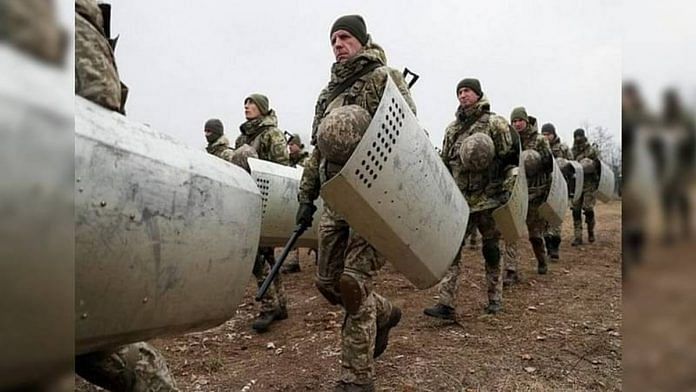New Delhi: Russia’s war on Ukraine could have a ballooning effect on European military expenditure. With Germany reversing a decades-old freeze on defence spending, this could be the dawn of a new era of inflated European defence budgets.
Many other European nations have either already hiked, or plan to hike, their defence budgets. But how they balance these spending promises with capacity issues, the implications of years of underspending, and “ambitious” fiscal defence needs will determine the future of Europe’s security.
While aggressive posturing by Moscow was always going to face pushback from Europe, the scale of military spending on display by Russia has pushed the needle forward on defence spending in Brussels.
On the day Russia announced its military operations in Ukraine, European markets collapsed — but, defying the trend, the share prices of defence stocks rose. Britain’s largest defence firm, BAE Systems, Germany’s Rheinmetall and France’s Thales were the early gainers on the day of the announcement, with markets expecting European defence budgets to rise in the short term, at least.
But although the calls for greater spending and promised hikes were overdue, they mask significant contradictions within Europe’s defence capacities.
Also Read: Renewable energy gets fresh boost as Europe finds ways to do without Russian oil & gas
Europe committing to increasing defence spending
Latvian President Egils Levits has said that while the European Union (EU) remains one of the most important economic players globally, it is a “midget” in political terms. The EU’s reality has been of significant underspending on defence and the military.
However, Egils added that there is now an opportunity to ensure that the EU reaches its deserved level of political and military might, clearly echoing European sentiments for enhanced fiscal outlays on defence.
Addressing the German parliament on 27 February, Chancellor Olaf Scholz had declared that the Russian invasion of Ukraine was a “turning point in the continent’s history”. To prepare Germany for this, Scholz allocated an additional €100 billion for the country’s armed forces, nearly doubling its last budget of €47 billion.
With this budgetary outlay, Scholz reworked decades of German foreign policy orthodoxy that had abstained from posturing against Russia after World War II, even through Russia’s annexation of Crimea in 2014.
Apart from Germany, given the ominous security situation in Europe, many other EU states are also increasing or planning to top up their defence budgets.
Swedish Prime Minister Magdalena Andersson declared on 1 March that Sweden would enhance its expenditure on defence. Romanian President Klaus Iohannis has also said that his country would push defence spending to 2.5 per cent of gross domestic product (GDP), from the current 2 per cent mark.
Taking a cue from their president’s statement, Latvia’s cabinet confirmed on 1 March a plan to hike defence expenditure to 2.5 per cent of GDP by 2025.
Reports from Finland have suggested that raising defence budgets will be inevitable given Russia’s invasion of Ukraine.
The Netherlands had already hiked their defence budget by 6.5 per cent in 2021. Belgium had also announced earlier this year that it would invest an additional €14 billion over the next eight years. It is to be seen whether these two countries will announce further hikes given the conflict in Ukraine.
Given the circumstances in Ukraine, Liz Truss, foreign secretary for the United Kingdom, has also called for Westminster to increase defence spending. This comes after Prime Minister Boris Johnson’s announcement in 2020 that the UK would bring a £16.5 billion investment into defence — marking the highest allocation for the armed forces since the end of the Cold War.
France had also hiked defence budgets for 2022 by €1.7 billion from the previous year.
In essence, Russia’s misadventures have accelerated a process of increased defence spending by EU states that had started incrementally.
Capacity problems contradict promises
Despite Britain’s calls for enhanced spending, the British Army is being reduced to 73,000 soldiers, its smallest size since the Napoleonic era. Further cuts to the number of battle tanks, aircraft, fighting vehicles, frigates, and destroyers are also being reported.
A report from Britain’s National Audit Office states that despite a commitment to increasing defence spending, “ambitions outstrip the resources available”. With these cuts to military capacity and inconsistencies between spending intent and actions, there could be severe problems with the UK’s military capabilities.
Before the announcement by Chancellor Scholz, the German army’s chief of staff, Lt. General Alfons Mais, had said that “the army that I am allowed to lead is more or less powerless”.
Lt. General Mais was also critical of the “systemic neglect” that has plagued the German army — perhaps a veiled criticism towards the policy of successive governments to scale down military spending since the end of the Cold War.
Furthermore, the European Defence Agency (EDA) had reported last month that joint investments by EU members had fallen in 2020. The EDA said that EU members were not spending enough on defence research and technology.
(Edited by Gitanjali Das)
Also Read: West’s bid to shut down Russian economy normally an ‘act of war’, says India’s ex-envoy to Moscow



